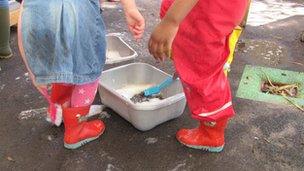Free nursery place scheme sees shortfall
- Published

Two-year-olds whose parents are on certain benefits and those in care qualify
Three out of 10 of the most disadvantaged two-year-olds have still to be found a place on a flagship childcare scheme, figures show.
Ministers pledged 15 hours a week of free childcare to 130,000 two-year-olds in England from September.
But the latest Department for Education data shows while 92,000 children are receiving such care, 38,000 are not.
Childcare providers said the offer, which was heralded by the deputy prime minister, was not properly funded.
Neil Leitch, chief executive of the Pre-School Learning Alliance, said at a time when many providers were still underfunded for the existing free nursery place scheme for all three- and four-year-olds, it was vital that the government makes sure the two-year-old scheme is adequately funded.
"This will determine the success of the initiative and the positive impact for generations to come.
"While the latest take-up figure is extremely positive, we need to ensure that there is a long term strategy of continuous support in place to ensure that all participating providers are able to offer high quality, appropriate care and education."
Some nursery providers say the average rate of funding, £5.12 per hour, is so low the work they would have to carry out with these disadvantaged children would effectively be "pro bono". This is because of the very high level of need that the children have because they are younger and sometimes highly troubled.
Places also have to be in settings rated good or outstanding by Ofsted.
In May, the BBC News Website reported that the scheme was 55,000 places short, and there were warnings that it would not open fully in all areas, with shortages predicted in London and other urban areas.
Both Deputy Prime Minister Nick Clegg and Education and Childcare Minister Liz Truss have stressed the need to give disadvantaged children, who tend to do worse at school, the best start in life.
'Fall behind'
Mr Clegg praised the number of places made available on the scheme, saying: "Early access to high-quality childcare is vitally important to ensure children are ready for school, ready for the world and able to get a good start in life.
"Giving disadvantaged children early support gives them the best possible chance to succeed, it means they're less likely to fall behind their wealthier classmates and it can make a huge impact on their future. It is vital for a fair and prosperous society."
However, the Department for Education has now said the funding for the places will in future be on a "use it or lose it basis".
"The number of participating children will determine the amount of funding they get," it said.
"Where parents are not taking up these place, local authorities will get less money."
The department is due to expand the scheme to 260,000 children in England next September.
Childcare workers association Pacey, which represents many childminders, welcomed the fact that, so far, 70% of eligible families had signed up to receive the free entitlement for childcare.
But it said it was concerned that the government had already noted that in some areas it might not have enough providers rated good or outstanding to cover all the children entitled to the two-year-old offer, and would have to use providers graded as requiring improvement.
Its chief executive, Liz Bayram, said: "This is of even more concern given the emerging evidence that individual childminders are struggling to access funding through this scheme, as local authorities seem to show a preference for nursery settings to deliver this care, even if those settings might not be good or outstanding.
"Many families benefit from the flexible home-based service that childminders offer, so ensuring parents can make a real choice about the type of childcare that is right for them could only help increase uptake even further."
Labour's shadow minister for childcare and children, Lucy Powell, said the "cost of living crisis" was being made worse by families who were promised free childcare finding that they do not have a place.
"This government has hit families with reduced support, rising childcare costs and fewer places. Labour's primary childcare guarantee and the extension of free childcare for working parents from 15 to 25 hours for three and four year olds will be a real boost for families feeling the pinch and struggling to balance work and family life."
- Published7 May 2013
- Published11 November 2011